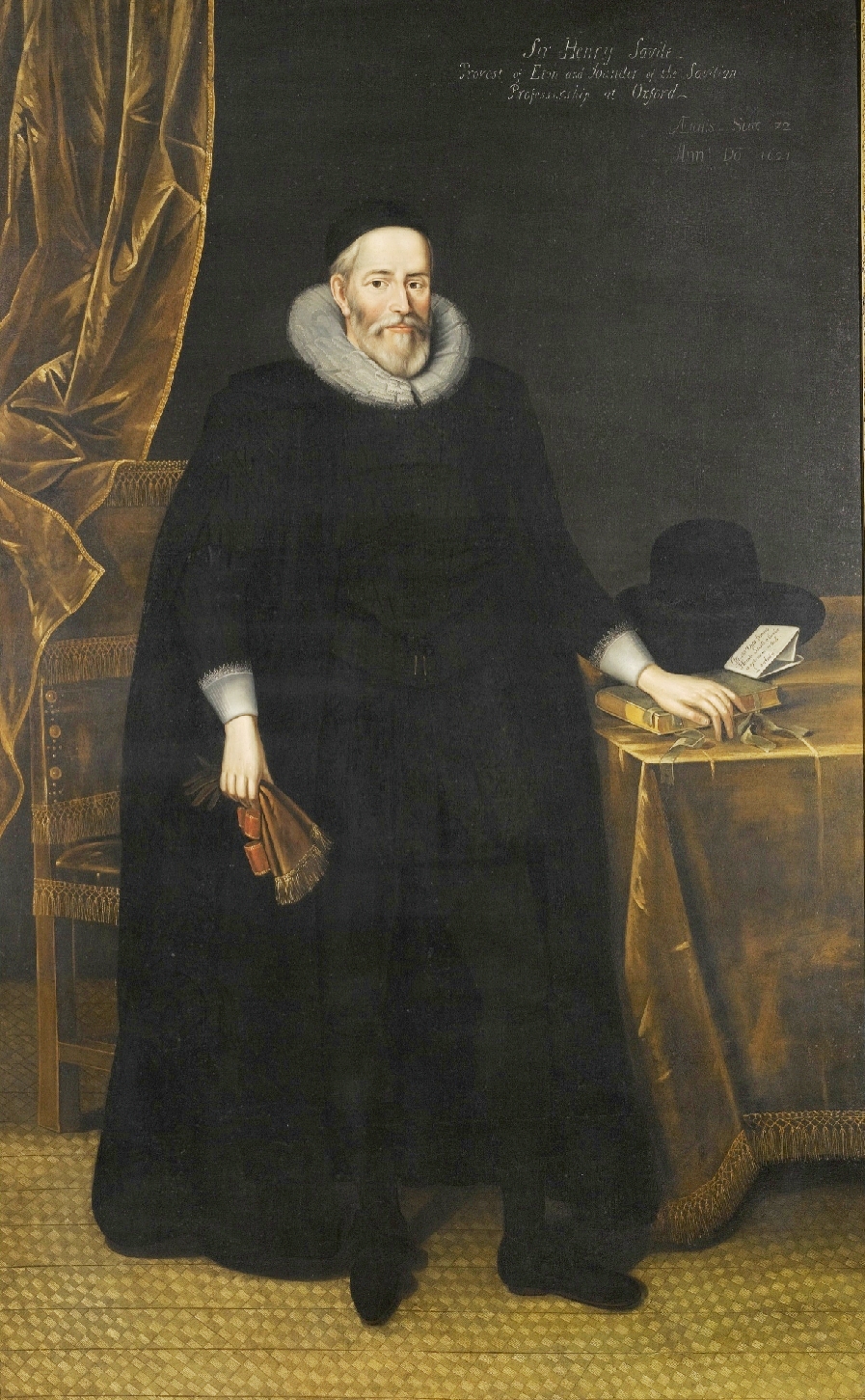
Henry Savile (Bible translator)
Sir Henry Savile (30 November 1549 – 19 February 1622)[1] was an English scholar and mathematician, Warden of Merton College, Oxford, and Provost of Eton.[2] He endowed the Savilian chairs of Astronomy and of Geometry at Oxford University, and was one of the scholars who translated the New Testament from Greek into English. He was a Member of the Parliament of England for Bossiney in Cornwall in 1589, and Dunwich in Suffolk in 1593.[3]
For other people with the same name, see Henry Savile (disambiguation).Life[edit]
He was the son of Henry Savile of Over Bradley, Stainland, near Halifax, West Yorkshire, England,[1] a member of an old county family, the Saviles of Methley, and of his wife Elizabeth, daughter of Robert Ramsden.[3]
Savile matriculated at Brasenose College, Oxford in 1561. He then became a Fellow of Merton College in 1565.[4] He established a reputation as a Greek scholar and mathematician by voluntary lectures on Ptolemy's Almagest, and in 1575 became Junior Proctor of the university. In 1578 he travelled on the continent of Europe, where he collected manuscripts, and is said to have been employed by Queen Elizabeth as her resident in the Low Countries. On his return he was named Greek tutor to the Queen.[5][3]
In 1583, Lord Burghley appointed Savile, with John Chamber and Thomas Digges, to sit on a commission to consider whether England should adopt the Gregorian calendar, as proposed by John Dee.[6] In 1585 he was established as Warden of Merton by a vigorous exercise of the interest of Burghley and Secretary Walsingham. He proved a successful and autocratic head of house, generally unpopular with Fellows and undergraduates, but under him the college flourished. His translation of four books of the Histories of Tacitus, with the learned Commentary on Roman Warfare (1591), enhanced his reputation.[5][7] He also sat in Parliament as one of the two members for Bossiney in 1589 and for Dunwich (both were notorious rotten boroughs) in 1593.[3]
On 26 May 1596 he obtained the provostship of Eton College, the reward of persistent begging. He was not qualified for the post under the statutes of the college, for he was not in holy orders, and the Queen was reluctant to name him. Savile insisted with considerable ingenuity that the Queen had a right to dispense with statutes, and at last he got his way. In February 1601 he was put under arrest on suspicion of having been concerned in the rebellion of the Earl of Essex.[5]
He was soon released, and his friendship with the faction of Essex went far to gain him the favour of James I. So no doubt did the views he had maintained in regard to the statutes of Eton. It may have been to his advantage that his elder brother, Sir John Savile (1545–1607), was a high prerogative lawyer and one of the barons of the exchequer, who in 1606 affirmed the right of the King to impose import and export duties on his own authority.[5]
On 30 September 1604 Savile was knighted, and in that year he was named one of the body of scholars appointed to prepare the Authorised Version of the Bible. He was entrusted with parts of the Gospels, the Acts of the Apostles and the Book of Revelation.[5]
In 1619 he founded and endowed a chair in astronomy and a chair in geometry at Oxford, both bearing his name. He died at Eton on 19 February 1622, and is buried there. A fine mural monument to him in Merton College Chapel offers views of contemporary Merton and Eton and references to his literary achievements (notably Chrysostom).
Sir Henry Savile has sometimes been confounded with another Henry Savile, called Long Harry (1570–1617), who gave currency to the forged addition to the Chronicle of Asser which contains the story that King Alfred founded the University of Oxford.[5]
Family[edit]
In 1592 he married Margaret, daughter of George Dacre, of Chesham. In 1604 their only son died, and Savile is thought to have been induced by this loss to devote the bulk of his fortune to the promotion of learning. His surviving child Elizabeth married Sir John Sedley and was mother of Sir Charles Sedley.[21]
His brother, Thomas Savile (died 1593), was also a member of Merton College and had some reputation as a scholar.[21]
![]() Media related to Henry Savile at Wikimedia Commons
Media related to Henry Savile at Wikimedia Commons